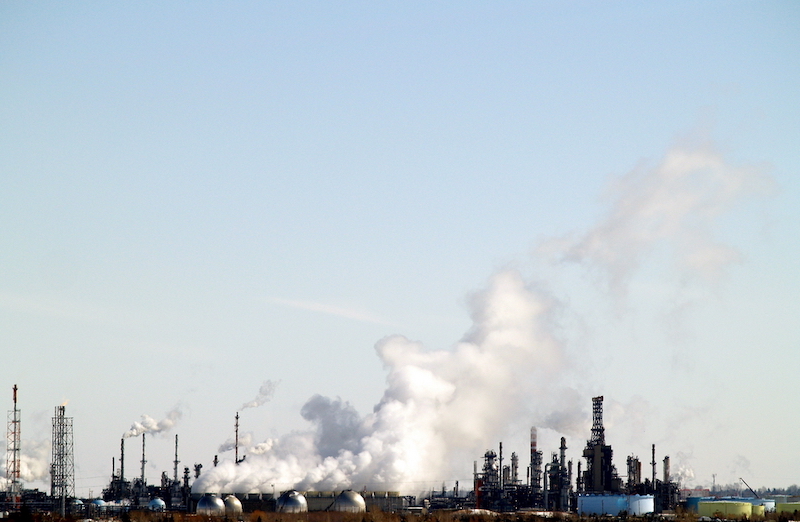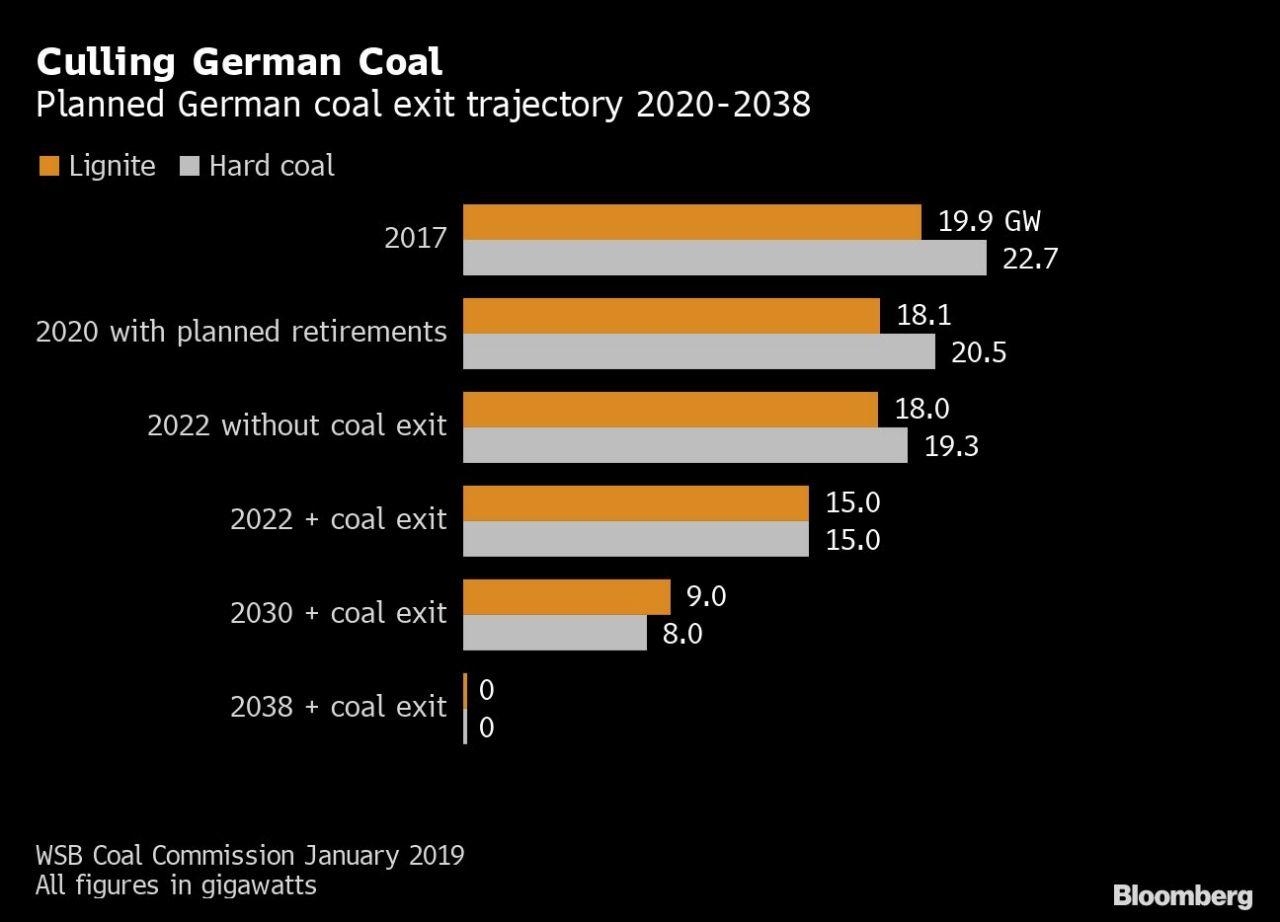Home » Posts tagged 'fossil fuels' (Page 18)
Tag Archives: fossil fuels
How to Get Off Fossil Fuels Quickly—and Fairly
How to Get Off Fossil Fuels Quickly—and Fairly
 Researchers from the National Renewable Energy Laboratory (NREL) discuss panel orientation and spacing for a project on simultaneously growing crops under PV Arrays while producing electricity from the panels in South Dearfield, Massachusetts. The project is part of the DOE InSPIRE project seeking to improve the environmental compatibility and mutual benefits of solar development with agriculture and native landscapes.PHOTO FROM SCIENCE IN HD/UNSPLASH Climate experts share a range of ideas and strategies for envisioning a better future.
Researchers from the National Renewable Energy Laboratory (NREL) discuss panel orientation and spacing for a project on simultaneously growing crops under PV Arrays while producing electricity from the panels in South Dearfield, Massachusetts. The project is part of the DOE InSPIRE project seeking to improve the environmental compatibility and mutual benefits of solar development with agriculture and native landscapes.PHOTO FROM SCIENCE IN HD/UNSPLASH Climate experts share a range of ideas and strategies for envisioning a better future.
When it comes to a just transition, it’s going to take a radical reimaging not only of our economy but also of our culture and the shape of our social structures. YES! co-hosted a conversation with experts from the nonprofit The Land Institute to discuss policy proposals and new ways to rebuild our sense of self and community from the bottom up.
The discussion was prompted by a new book, The Green New Deal and Beyond, by Stan Cox, the Land Institute’s lead scientist for perennial crops. He was joined by his colleagues, Director of Ecosphere Studies Aubrey Streit Krug, and President Emeritus Wes Jackson. The event was moderated by YES! contributing editor Robert Jensen.
Together they share a range of ideas and strategies for envisioning a better future.
The conversation has been edited and condensed for clarity.
ROBERT JENSEN: I would propose that the most important word in the title of your book, Stan, is “beyond.” We know the Green New Deal is not a fully fleshed out political program yet, but why do we need to go beyond it?
…click on the above link to read the rest of the article…
Vatican Asks Catholics to Ditch Fossil Fuel Investments
Vatican Asks Catholics to Ditch Fossil Fuel Investments
The Vatican urged Catholics to closely consider where they invest their money and to take a close look at the environmental impact of the companies they may be shareholders in, as Reuters reported.
Pope Francis has frequently criticized wanton greed that has led to environmental degradation and a climate crisis that is uprooting the lives of the world’s most vulnerable and impoverished people. On Earth Day, the Pope gave a speech in which he said that humans have sinned against the earth, as EcoWatch reported at the time.
To follow up on the pontiff’s works, the Vatican released a 225-page manual for church leaders and workers that included the guidance to end investments in weapons manufacturing and defense systems, fossil fuels, and to closely monitor companies in the energy sector to see if their actions are causing environmental harm, according to Reuters.
The manual, called Journeying Towards Care For Our Common Home, is a follow up to the Pope’s landmark encyclical on climate change called “Laudato Si’, on Care for Our Common Home,” which gave the official Catholic Church seal of approval to the pope’s environmental concerns. The new compendium offers practical steps to follow up on the Laudato Si, which translates from Latin to Praise Be.
As Reuters reported, the manual’s finance section said that shareholder action “could favor positive changes … by excluding from their investments companies that do not satisfy certain parameters.” It listed these as respect for human rights, bans on child labor, and protection of the environment.
…click on the above link to read the rest of the article…
The Recent History of GDP Growth, CO2 Emissions, and Climate Policy Paralysis, All in One Table-Runner
The Recent History of GDP Growth, CO2 Emissions, and Climate Policy Paralysis, All in One Table-Runner

Note: I began designing this table-runner just before the COVID-19 pandemic blew up in the United States. In the time I have been embroidering it, rates of death and misery have soared while wealth generation and carbon emissions (the two subjects of this work) have ended their decades-long rise and have plummeted. A deadly virus is a terrible means of slowing greenhouse warming. Whenever we come out the other side of the pandemic, we must pursue a rapid, humane, ecologically sound, and guaranteed-effective course of action to drive greenhouse emissions down to zero. Here’s how. — P.G.C.

The color of money is the color of calamity
This table-runner illustrates, from left to right, the increase in atmospheric carbon dioxide concentration from 1946 to the present. Each year is represented by two adjacent stripes: one in gradually deepening shades of green representing that year’s U.S. gross domestic product (adjusted for inflation) and one in increasingly intense shades of yellow-orange-red, representing CO2 concentration.
There are nine shades for GDP and eleven for CO2, with shades indicating roughly equal intervals of increase in each. The shades of both types of stripes darken as the years go by, in accordance with the increases that occurred in both GDP and CO2. (For hi-res, zoomed-in images of the table-runner, see here.)
The shades of yellow-orange-red in the table-runner darken more and more rapidly as the years pass, illustrating how emissions of CO2 accelerated as industrial output and fossil-fuel use rose more rapidly throughout the world. The concentration of CO2 rose at an annual rate of about 0.8 ppm from 1945 to 1980; 1.5 ppm from 1980 to 1995; and 2.1 ppm from 1995 to 2019. (The United States accounted for almost 20 percent of the rise in atmospheric CO2 during those years.)
…click on the above link to read the rest of the article…
Fossil-fueled industrial heat hard to impossible to replace with renewables
Fossil-fueled industrial heat hard to impossible to replace with renewables
Preface. Cement, steel, glass, bricks, ceramics, chemicals, and much more depend on fossil-fueled high heat (up to 3200 F) to make. Except for the electric-arc furnace to recycle existing steel, there aren’t any renewable ways to make cement, other metals, and other high-heat products, and industries aren’t working on this either.
***
Roberts, D. 2019. This climate problem is bigger than cars and much harder to solve. Low-carbon options for heavy industry like steel and cement are scarce and expensive. Vox
Climate activists are fond of saying that we have all the solutions we need to the climate crisis; all we lack is the political will. This is incorrect. There are some uses of fossil fuels, that we do not yet know how to decarbonize.
Take, for instance, industrial heat: the extremely high-temperature heat used to make steel and cement.
Heavy industry is responsible for around 22% of global CO2 emissions, with 42% of that — about 10% of global emissions — from combustion to produce large amounts of high-temperature heat for industrial products like cement, steel, and petrochemicals.
To put that in perspective, industrial heat’s 10% is greater than the CO2 emissions of all the world’s cars (6%) and planes (2%) combined. Yet, consider how much you hear about electric vehicles. Consider how much you hear about flying shame. Now consider how much you hear about … industrial heat.
Not much, I’m guessing. But the fact is, today, virtually all of that combustion is fossil-fueled, and there are very few viable low-carbon alternatives. For all kinds of reasons, industrial heat is going to be one of the toughest nuts to crack, carbon-wise. And we haven’t even gotten started.
…click on the above link to read the rest of the article…
Pandemic Response Requires Post-Growth Economic Thinking
Pandemic Response Requires Post-Growth Economic Thinking
The end of growth is painful. We had a foretaste of it in 2008, but the current crisis promises to be much worse.

Amid a horrific human tragedy of sickness and death, much of it taking place in hospitals staffed by brave but overworked and under-equipped doctors and nurses, we are all learning once again what it feels like when economic growth comes to a shuddering stop and the economy goes into reverse—shrinking and consuming itself. Millions have been thrown out of work, untold numbers of businesses shuttered. The St. Louis Federal Reserve estimates that Q2 unemployment could clock in as high as 32.1 percent (for comparison, unemployment at the depths of the Great Depression was 25 percent, and during the Great Recession of 2008-2010 it peaked at 10 percent). Though radical measures must now be adopted to slow the spread of the coronavirus, those measures are having toxic side effects on the economy.
Yet, economic growth was bound to end at some point, with or without the virus. A few moments of critical thought confirm that the exponential expansion of the economy—whose physical processes inevitably entail extracting natural resources and dumping polluting wastes—is destined to reach limits, given the obvious and verifiable fact that we live on a finite planet.
However, we also happen to live in a human social world in which a decades-long spurt of economic and population growth, based on the snowballing exploitation of a finite supply of fossil fuels, has become normalized, so that world leaders have come to agree that growth can and must continue forever.
…click on the above link to read the rest of the article…
How Does Pandemic Change the Big Picture?
How Does Pandemic Change the Big Picture?

As of 2019, the Big Picture for humanity was approximately as follows. Homo sapiens (that’s us), a big-brained bipedal mammal, had spent the Pleistocene epoch (from 2.5 million years ago until 12,000 years ago) developing its ability to control fire, talk, paint pictures, play bone flutes, and make tools and clothes. Language dramatically enhanced our sociality and helped enable us to invade and inhabit every continent except Antarctica. During the Holocene epoch (the last 12,000 years), we started living in permanent settlements, developed agriculture, and built state societies with kings, slavery, economic inequality, full-time division of labor, money, religions, and armies. The Anthropocene epoch (more of a brief interlude, really) dawned only a couple of centuries ago as we humans started using fossil fuels, which empowered us dramatically to grow our population and per capita consumption rates, mechanize production and transport, and basically dominate the entire planet. The mechanization of agriculture, by making the landed peasantry redundant, led to mass urbanization and quickly pumped up the size of the middle class. However, the use of fossil fuels destabilized the global climate, while also vastly increasing existing problems like pollution, resource depletion, and the destruction of habitat for most wild creatures. In addition, over the past few decades we learned how to use debt to transfer consumption from the future to the present, based on the risky assumption that the economy will continue to grow forever, thereby enabling future generations to pay for the lifestyle we enjoy now.
In short, the Big Picture was one of ever-increasing power and peril. Suddenly it has changed. A pattern of furious economic growth, consistent over many decades since the dawn of the Anthropocene (with only occasional interruptions, primarily consisting of the Great Depression and two World Wars), has slammed precipitously into the wall of pandemic (un)preparedness. In an effort to limit mortality from the novel coronavirus, governments around the world have put their economies into a state of suspended animation, telling most workers to stay home and to avoid direct contact with others.
…click on the above link to read the rest of the article…
New Study Finds Far Greater Methane Threat from Fossil Fuel Industry
New Study Finds Far Greater Methane Threat from Fossil Fuel Industry
The gas plays a powerful role in driving up global temperatures.

A new study published in Nature may have ended a long scientific debate about the key source of rising methane levels in the atmosphere.
It found that methane emissions from human activities — mainly fossil fuels — are probably 25 to 40 per cent higher than previously estimated, while natural sources of methane emissions are up to 90 per cent lower than previously estimated.
In plain English, that means the fossil fuel industry is having a much greater impact on climate destabilization than previously thought.
Methane, the main chemical constituent of natural gas, is a much more potent greenhouse gas than carbon dioxide in the short term. Although methane dissipates faster than carbon dioxide, it has 80 times the climate warming impact over a 20-year timespan.
Every day, the oil and gas industry burns or releases methane by design, often as an unwanted byproduct of oil production, or leaks it accidently through faulty or aging equipment — a form of chronic spillage known as “fugitive emissions.” The Tyee is supported by readers like you Join us and grow independent media in Canada
Methane also escapes while industry strips a number of impurities and contaminants from natural gas gathered in gas fields, including hydrogen sulfide and carbon dioxide.
For years the fossil fuel industry has claimed that natural gas is a clean fuel that will serve as bridge to a renewable future, but recent studiesshow leakage rates are highly underestimated, thereby challenging that claim.
…click on the above link to read the rest of the article…
Can Europe’s Largest Economy Survive Without Coal?
Can Europe’s Largest Economy Survive Without Coal?

One of the greatest moral dilemmas that has been creeping into the everyday activities of specialists working with coal, oil and in some cases even gas (despite its being perceived a natural bridge to a low-carbon future) could be phrased in the following way: how do you stop producing fossil fuels when you still have cheap ample reserves? In this context coal stands out – its relative inferiority in terms of environmental pollution prompted governments in developed economies to ban its future usage. Yet whenever its production is not curtailed by government-mandated cuts, producers simply continue to extract as much coal as possible. Straight in the middle of the so-called European approach to coal lies Germany, an erstwhile bulwark of the coal industry. Can it eventually survive without coal?
In stark contrast to oil and gas – of which Germany has traditionally been a major net importer and in both cases looking back to a more than 50-year history of depending on primarily Russian hydrocarbon riches – Europe’s leading economy has substantial reserves of coal, lignite in particular. In fact, Germany remains the world’s largest producer of lignite and burns most of it for power generation, accounting for some 22 percent of the nation’s gross electricity output. Ironically, lignite production is more CO2 intensive than hard coal as it is done by extracting coal from open-cast pits, nevertheless, its mid-term future looks a lot better than that of hard coal mining in Germany.
Whilst lignite remains economically competitive, Germany’s hard coal production went downhill after the government ended its subsidy schemes. The last hard coal mine closed its gates in December 2018, ending a 200-year history of the Ruhr Region and potentially starting a new development phase of Westphalia, a geographical phenomenon inextricably intertwined with coal.
…click on the above link to read the rest of the article…
Burning Trees For Heating Won’t Help With Climate Change: UK Think Tank
Burning Trees For Heating Won’t Help With Climate Change: UK Think Tank

A suggestion by the UK Committee on Climate Change to burn more wood and plant replacement trees as a sustainable alternative to fossil fuels has drawn criticism from think tank Chatham House, which says this is hardly the best approach to reducing emissions.
“Expanding forest cover is undoubtedly a good thing, if you’re leaving them standing,” energy expert Duncan Brack told the Daily Telegraph. However, Brack, who served as special adviser to the Department of Energy and Climate Change, suggested that burning wood for heating was not the most sustainable way forward. Calling wood burning a carbon neutral process is “highly dubious,” Brack added.
These claims, according to the Telegraph’s environment editor, Emma Gatten, rest on the assumption that the carbon footprint of chopping down trees and burning them is offset by planting new trees to replace them. This assumption excludes the fact that older trees absorb more carbon and that it takes time to replace a forest.
“You can leave trees standing and they will continue to absorb carbon for decades,” Brack says. “But the biomass industry implicitly assumes that forests at some point stop reach a saturation point for carbon intake and can be harvested and simply replaced.”
The benefit of planting trees to mitigate the effects of climate change has been put to the test on a wider scale as well. A study released last year found that reforestation could work, but it had to be done at a massive scale.
We need to plant 25 percent more trees than there are on Earth right now, or more than half a trillion in total, the study found. This would reduce the amount of carbon in the atmosphere by a quarter, erasing 20 years of emissions. Yet it would not solve the climate problem on its own, without a sustained effort to cut emissions, commentators on the study said.
Merkel Inks Deal For Stalled German Coal Exit
Merkel Inks Deal For Stalled German Coal Exit
In a move that’s sure to restore a smidgen of Greta Thunberg’s childhood, German Chancellor Angela Merkel has finally hammered out a deal for Germany’s stalled exit from coal-fired power generation, after state leaders agreed to shut down the industry by 2038.
We would note that this falls outside the 12-year window of doom predicted by US climate expert Alexandria Ocasio-Cortez, but better late than never when environmental apocalypse is on the line.
Germany’s plan includes 40 billion euros ($44.6 billion) in compensation for impacted regions, according to Bloomberg. The country’s largest coal-fired power producer, RWE AG, will receive 2.6 billion euros according to an insider – sending the stock up 1.7% in mid-morning trade on Thursday. In eastern Germany, utility Lignite operators will receive 1.75 billion euros according to German Finance Minister Olaf Scholz.
Germany reaches agreement to phase out coal by 2038

Merkel has been in a tight spot on the issue, facing pressure from environmentalists and miners alike. Climate tops voter concerns, and Germany will already miss its 2020 targets under the Paris Agreement. On the other hand, the poorer states in the former Communist East, where the bulk of the mines are, fear a growing gap to the West. Her predicament feeds into a broader political challenge, with the Greens party and the far-right Alternative for Germany gaining support on both sides of the political spectrum to squeeze Germany’s traditional mainstream parties, including her Christian Democrats. The AfD has been particularly strong in the eastern mining states.
“It was a long night — it lasted until 2 a.m. — but we were able to achieve a sensible agreement,” Armin Laschet, premier of the state of North-Rhine Westphalia, said in an interview with Deutschlandfunk radio. “The time frame that we’ve agreed on is ambitious, but realistic.” –Bloomberg (via Yahoo!)
…click on the above link to read the rest of the article…
Surf’s Up!
Surf’s Up!
The wave of change is finally here. Are you prepared to ride it?
Nothing seems right anymore.
In whichever direction we choose to look, things are unraveling at a quickening pace.
Welcome to the Fourth Turning; and with it, a profound loss of trust in institutions and government.
Such lack of social cohesion is a hallmark of a Fourth Turning. Sadly, it’s happening at a time when society desperately needs to pull together, set aside our differences, and make some really big decisions.
Dirty Hands Everywhere
For my own part, my loss of trust in what is termed the ‘mainstream media’ (MSM) is nearly complete. Its sins of omission and commission have piled up too high to forgive – the bank of trust I once had in it has lost every penny and is now in deep overdraft.
In my opinion its gravest sin is the willful and deliberate fracturing of society into many disparate warring camps. The MSM has a lot to answer for in that regard.
Similarly guilty is our political system. The core power players are unable to hold each other accountable, revealing that we don’t have two parties after all, but rather a uniparty organized around power and money.
The rules are increasingly re-written to benefit a smaller and smaller group of elites at the expense of everyone else — and that’s now becoming increasingly crystal clear to the 99.9% who are getting screwed. The corrosive effects of that are going to take decades to resolve.
As a result, the social fabric is rending apart. Stress is epidemic with more people than ever reporting being unhappy, unfulfilled, isolated and alone. Suicide is the second leading cause of death. It’s worse than just depression, it’s something far more insidious — it’s demoralization. There’s no hope left any more for too many of us.
A Dying Ecosphere
…click on the above link to read the rest of the article…
Why UVic Faculty Massively Voted to Divest from Fossil Fuels
Why UVic Faculty Massively Voted to Divest from Fossil Fuels
It’s time to walk the talk on reconciliation and the climate crisis.

Therefore, we think it is hypocritical for UVic to present itself as a sustainability and reconciliation leader while investing in companies that are primarily responsible for both the climate emergency and Indigenous dispossession.
For example, UVic has $2.5 million invested in Imperial Oil (the Canadian subsidiary of ExxonMobil). Records show that Imperial Oil’s own scientists confirmed the realities of climate change as early as the 1970s, and yet the company has willfully pursued denial and policy obstructionism as an accumulation strategy. By investing millions of dollars into Imperial Oil, UVic is tacitly supporting its history of climate change denial; indeed, the university is hoping to profit from it. That is sustainability leadership in high-speed reverse.
Many fossil fuel companies also contribute to the destruction of Indigenous lands and waters with their pursuit of new fossil fuel infrastructure projects. For example, UVic’s endowment fund has $700,000 invested in Teck Resources. Teck is currently pursuing one of the largest open-pit oil sands mines ever proposed. The project is in close proximity to many Cree and Dene families. According to Indigenous Climate Action, “This project threatens our Indigenous rights, ways of life, and ability to ensure the preservation of our lands and territories.”
The investment in Teck Resources contradicts UVic’s Strategic Plan and Indigenous Plan, which “commits to building and strengthening respectful relationships with Indigenous communities locally, provincially, nationally and around the world.” How can UVic claim that reconciliation and respectful Indigenous relationships are top priorities while materially investing in the ongoing dispossession of Indigenous peoples as well as destruction of their homelands and waterways?
…click on the above link to read the rest of the article…
Boston Globe: the false promise of nuclear power
Boston Globe: the false promise of nuclear power
Preface. This article raises many objections to nuclear power. Theoretically it could be cheaper, but the exact opposite has happened, it keeps getting more expensive. For example the only new reactors being built in the U.S. now are at Georgia Power’s Vogtle plant. Costs were initially estimated at $14 billion; the latest estimate is $21 billion. The first reactors at the plant, built in the 1970s, took a decade longer to build than planned, and cost 10 times more than expected. The two under construction now were expected to be running 2016, but it’s now unlikely that they’ll be ready in 2022.
The authors also point out that reactors are vulnerable to catastrophes from extreme weather, earthquakes, volcanoes, tsunamis; from technical failure; and unavoidable human error. Climate change has led to severe droughts that shut down reactors as the surrounding waters become too warm to provide the vital cooling function.
And much more.
***
Jay Lifton, Naomi Oreskes. 2019. The false promise of nuclear power. Boston Globe.
Commentators from Greenpeace to the World Bank agree that climate change is an emergency, threatening civilization and life on our planet. Any solution must involve the control of greenhouse gas emissions by phasing out fossil fuels and switching to alternative technologies that do not impair the human habitat while providing the energy we require to function as a species.
This sobering reality has led some prominent observers to re-embrace nuclear energy. Advocates declare it clean, efficient, economical, and safe. In actuality it is none of these. It is expensive and poses grave dangers to our physical and psychological well-being. According to the US Energy Information Agency,the average nuclear power generating cost is about $100 per megawatt-hour. Compare this with $50 per megawatt-hour for solar and $30 to $40 per megawatt-hour for onshore wind. The financial group Lazard recently said that renewable energy costs are now “at or below the marginal cost of conventional generation” — that is, fossil fuels — and much lower than nuclear.
…click on the above link to read the rest of the article…
Big Oil Needs to Pay for the Damage It Caused
Big Oil Needs to Pay for the Damage It Caused

Environmental activists rally for accountability for fossil fuel companies outside of New York Supreme Court on October 22, 2019, in New York City. New York’s attorney general, Letitia James, is taking on ExxonMobil in a landmark case that accuses the oil corporation of misleading investors about the company’s financial risks from climate change.DREW ANGERER/GETTY IMAGES
This month in a Manhattan courthouse, New York State’s attorney general Letitia James argued that ExxonMobil should be held accountable for layers of lies about climate change. It’s a landmark moment—one of the first times that Big Oil is having to answer for its actions—and James deserves great credit for bringing it to trial. But it comes with a deep irony: Under the relevant New York statutes, the only people that New York can legally identify as victims are investors in the company’s stock.
It is true that Exxon should not have misled its investors—lying is wrong, and that former CEO Rex Tillerson had to invent a fake email persona as part of the scheme (we see you, “Wayne Tracker”) helps drive home the messiness. But let’s be clear: On the spectrum of human beings who are and will be hit by the climate crisis, Exxon investors are not near the top of the list.
In fact, if the “justice system” delivered justice, the payouts for Exxon’s perfidy would go to entirely different people, because the iron law of climate is, the less you did to cause it, the more you’ll suffer.
The high-end estimate for economic damage from the global warming we’re on track to cause is $551 trillion, which is more money than exists on planet Earth.
…click on the above link to read the rest of the article…
[Episode #108] – Will Energy Transition Be Rapid or Gradual?
[Episode #108] – Will Energy Transition Be Rapid or Gradual?
Champions of energy transition see it happening relatively quickly, emphasizing the advances that are being made in technologies, policy, and projects. While fossil fuel incumbents see a long, gradual process of energy transition, assuring us that demand for their products will remain strong for decades to come. So who’s right? Is energy transition going to be rapid, or gradual?
A new paper co-authored by Carbon Tracker, Bloomberg New Energy Finance, and the Rocky Mountain Institute contrasts these narratives and scenarios, and identifies some key distinguishing characteristics that can help us understand where they differ, as well as clarifying their underlying assumptions and perspectives, using those insights to inform our outlooks. In this episode, one of the authors from Carbon Tracker explains the analytical framework applied to these contrasting narratives, and shares his insights about the impact of the energy transition on financial markets, domestic politics and geopolitics, and how incumbents will have to navigate the new reality of climate change.Guest:
Kingsmill Bond is the Energy Strategist for Carbon Tracker, a London-based clean energy think tank. He believes that the energy transition is the most important driver of financial markets and geopolitics in the modern era. Over a 25 year career as an equity analyst and strategist at institutions such as Deutsche Bank, Sberbank and Citibank, he has researched emerging markets, the shale revolution and the impact of US energy independence. At Carbon Tracker, he has written about the impact of the energy transition on financial markets, domestic politics and geopolitics, and authored a series of reports on the myths of the energy transition, looking at the many arguments made by incumbents to deny the reality of change.
On Twitter: @KingsmillBond
On the Web: Kingsmill’s page at Carbon Tracker



